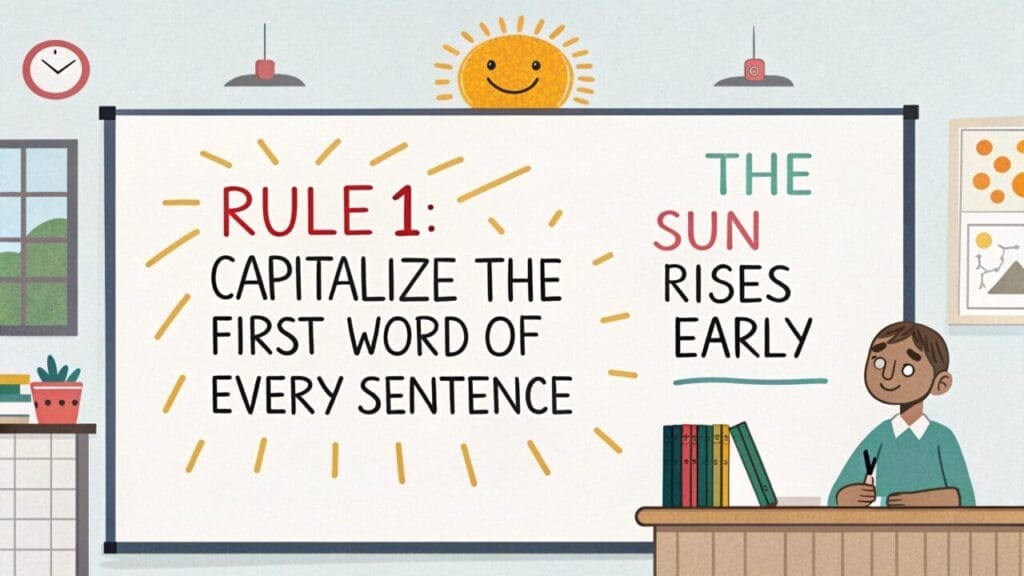A Guide to English Capitalization Rules
Capitalization can feel like a maze, but it’s a key part of clear, professional writing. Whether you’re crafting a letter, writing a story, or just brushing up on grammar, knowing capitalization rules is essential. This blog breaks down the essential English capitalization rules with simple explanations and examples. Let’s dive in!
1. Capitalizing Sentences
Every sentence kicks off with a capital letter. It’s the golden rule of writing, no exceptions.
- Rule: Capitalize the first letter of every sentence.
- Example: The sun rises early.
Whether it’s a statement, question, or exclamation, the first word gets the uppercase treatment.

2. Quotations
Quotations can be tricky, but the rule is straightforward: capitalize the first word of a direct quote if it’s a complete sentence.
- Rule: Capitalize the first word of a direct quotation if it’s a full sentence.
- Example: She said, “We need to leave now.”
- Rule: Don’t capitalize if the quote is a fragment or part of a larger sentence.
- Example: She called it “absolutely breathtaking.”
If the quote continues after an interruption, only capitalize if it starts a new sentence.
3. Salutations and Closings
Writing a letter? The salutation and closing have their own capitalization quirks.
- Rule: Capitalize the first word and all nouns in a letter’s salutation.
- Example: Dear Mr. Smith,
- Rule: Capitalize only the first word in the closing.
- Example: Sincerely yours,
This keeps your letters polished and professional.
Also read : Capitalization Rules in English
4. The Pronoun “I”
The pronoun “I” is special—it’s always capitalized, no matter where it sits in a sentence.
- Rule: Always capitalize the pronoun “I.”
- Examples:
- I went to the store.
- She and I are friends.
- Examples:
No other pronoun gets this VIP treatment!
5. Compass Directions
Compass directions like north or south are capitalized only when they refer to specific regions, not general directions.
- Rule: Capitalize compass directions when they name a specific region.
- Example: The South is humid, but drive south on the highway.
- Rule: Don’t capitalize generic terms like “city” or “river” unless they’re part of a proper name.
- Example: Mississippi River, but the river flows.
Think “The West” (a region) vs. “go west” (a direction).
6. Proper Nouns
Proper nouns—specific names of people, places, or things—are always capitalized. Let’s break it down.
6.1. Names of People
- Examples: John Smith, Malala Yousafzai
Your name, your friend’s name, or a famous person’s name—all capitalized.
Also read : 8 Classroom Activities for Teaching Simple Present
6.2. Titles of People
Titles like “Doctor” or “President” are capitalized when tied to a specific person or used formally, but lowercase when general.
- Rule: Capitalize titles when used with a name or in direct address.
- Examples: Dr. Jane Doe, President Lincoln, Good morning, Professor!
- Rule: Use lowercase for generic titles.
- Example: The president spoke today.
- Common Titles:
- Government: President, Governor, Senator
- Medicine: Doctor, Surgeon General
- Education: Professor, Dean
- Military: General, Admiral
- Business: CEO, CFO
- And more, like Bishop, Judge, or Astronaut!
Titles often reflect rank or expertise and may require certifications (e.g., a medical degree for “Dr.”).
6.3. Days and Months
Days of the week and months are proper nouns, so they’re always capitalized.
- Examples:
- Days: Monday, Tuesday, Sunday
- Months: January, February, December
Seasons like spring or fall? Those stay lowercase unless part of a proper name (e.g., Spring Festival).
6.4. Places
Specific places—countries, cities, streets, or bodies of water—get capital letters.
- Countries: Saudi Arabia, Pakistan
- Regions:
- Saudi Arabia: Al Madinah, Eastern Province
- Pakistan: Punjab, Balochistan
- Cities:
- Saudi Arabia: Riyadh, Jeddah
- Pakistan: Karachi, Lahore
- Streets:
- Saudi Arabia: King Fahd Road, Ajyad Street
- Pakistan: Jinnah Avenue, Mall Road
- Seas and Oceans:
- Rule: Capitalize specific names of seas and oceans.
- Examples: Pacific Ocean, Red Sea
- Note: Don’t capitalize “sea” or “ocean” alone (e.g., the ocean is vast).
6.5. Buildings and Institutions
Famous buildings and institutions are proper nouns, so capitalize their names.
- Rule: Capitalize specific names of buildings and institutions.
- Examples:
- Buildings: Eiffel Tower, Taj Mahal
- Institutions: Harvard University, Red Cross
- Note: Generic terms like “tower” or “university” are lowercase (e.g., the university is closed).
- Examples:
7. Books, Movies, Art, and Articles
Titles of creative works follow title case: capitalize major words (nouns, verbs, adjectives, adverbs) but not minor ones (articles, prepositions) unless they start the title.
- Books:
- The Lord of the Rings (J.R.R. Tolkien)
- Girls of Riyadh (Rajaa Alsanea)
- Movies:
- Titanic (James Cameron)
- Wadjda (Haifaa Al Mansour)
- Artworks:
- Mona Lisa (Leonardo da Vinci)
- The Veil (Rashid Rana)
- Articles:
- I Have a Dream (Martin Luther King Jr.)
- Malala’s Legacy: Education Reform in Pakistan (BBC News)
These titles grab attention with proper capitalization!
8. Proper Adjectives
Adjectives derived from proper nouns (e.g., a country or person) are capitalized.
- Rule: Capitalize proper adjectives.
- Examples: American flag, Shakespearean play
- Rule: Don’t capitalize common adjectives or nouns unless part of a proper name.
- Example: A French restaurant, but French cuisine
- Rule: Capitalize brand names, not generic products.
- Example: Nike shoes, but running shoes
Note: Some terms like “french fries” are lowercase due to common usage, but that’s an exception.
9. Interjections in Titles
Interjections like “Wow” or “Oh” are capitalized when they start a sentence or appear in a title.
- Rule: Capitalize interjections in titles or at the start of a sentence.
- Examples:
- Oh, the Places You’ll Go! (Dr. Seuss)
- Alas, Babylon (Pat Frank)
- Examples:
In regular sentences, interjections are lowercase unless they kick things off (e.g., “Wow, that’s cool!” vs. “That’s wow-level cool.”).
Conclusion
Mastering capitalization makes your writing clear and professional. From sentences to proper nouns to book titles, these rules are your roadmap. Bookmark this guide, and you’ll never second-guess whether to capitalize “South” or “president” again!







